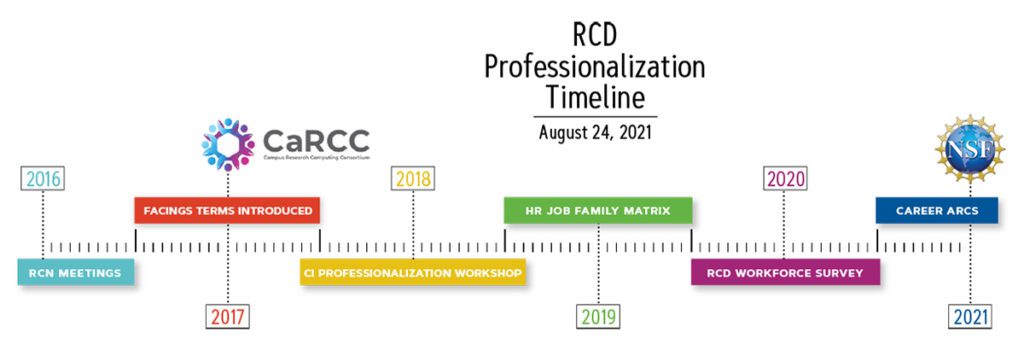By Maya Gurarie, Digital Experience Specialist
Estimated reading time: 5 minutes
The students are back. Campus might look like brick and mortar buildings, virtual classrooms, or both this year. What are the challenges facing educational institutions in supporting computationally and data intensive research? A panel of speakers from the Campus Research Computing Consortium (CaRCC) addressed key topics in a webinar on August 18. They discussed resources that connect communities such as the People Network, the RCD Capabilities Model Partnership, and the RCD Nexus.
“What are the challenges across the board we can address together? Across the ecosystem, it comes down to the people who can be the trusted brokers between the communities to know that we are in this together. We will serve the nation and the world better if we can share, trust, and fill gaps to help each other,” said Internet2 Executive Director of Research Engagement Dana Brunson.
CaRCC supports research computing and data (RCD) professionals with career development and visibility to deliver services for researchers. The CaRCC community supports a variety of professionals to develop cyberinfrastructure (CI), machine learning, data movement and management, desktop support, cloud computing and other functions of research. CaRCC hosts working groups for CaRCC activities, and provides website resources to foster participation, best practices for conducting meetings, e-mail lists, calendaring, workshops, and virtual conferences.
One of CaRCC’s core activities is the People Network, a year-round virtual conference with affinity-based tracks, an e-mail list with 1,097 subscribers, and a YouTube channel with 52,000 views. The YouTube channel features playlists that are updated monthly for each track with relevant presentations and discussions. Recordings from conferences and webinars are posted on YouTube for those who are unable to attend, or for future reference. The tracks include researcher-facing, data-facing, emerging centers, systems-facing, software-facing, and strategy and policy-facing. The focus is on communication and outreach due to the evolving job descriptions and the fact that they can be shared roles in higher education.
The RCD Capabilities Model Partnership
The RCD Capabilities Model allows institutions to assess their support for computationally- and data-intensive research, to identify potential areas for improvement, and to understand how the broader community views Research Computing and Data support. Developed in a partnership among CaRCC, EDUCAUSE, and Internet2 (and supported by NSF funding), the Model is used by over 175 institutions across the United States, Canada, and beyond.
A related working group is using an NSF grant to assess CI readiness at under-resourced and under-served institutions, leveraging the RCD Capabilities Model and providing free consulting to participating institutions. The RCD Capabilities Model working group also provides many other resources to support institutions working with the Model.
Facilitators of the RCD Capabilities Model developed a Community Dataset that gathers baseline data about RCD support to influence policy makers and funders. This Community Dataset provides insight into the current state of support for RCD across the community.
The RCD Capabilities Model Partnership is actively soliciting contributions to the Community Dataset. Contributing institutions receive an individualized Benchmarking report that compares their assessment to the community, and to segments of the community (R1s, R2s, Public or Private institutions, etc.). The deadline for the assessments is September 30, 2021 using the following process:
- Review the Capabilities Model Introduction and Guide to Use
- Request a copy of the assessment tool
- After completing your assessment, turn in the submission form

RCD Professionalization
Organizations report a host of challenges hiring and retaining RCD professionals, just as individuals in these roles need support with training and professional development. The CaRCC RCD Professionalization working group is developing a range of tools and resources to address these gaps. These include an HR Job Family Matrix to provide relevant job families and classifications, and a national workforce survey to gather data on who is doing these jobs. The Career Arcs resource provides a framework to understand how people developed into these roles, and what their options are for a career as an RCD professional.
The Research Computing Workforce Survey has received 350 responses since it was published in June, with the goal set to collect 800 responses. Every current and former staff member supporting research is encouraged to take the survey. These resources will aid workforce development through the RCD Nexus, which is funded by the NSF Cyberinfrastructure Centers of Excellence (CI CoE) pilot.
RCD Nexus
Building upon the work described above, a new NSF-funded pilot Center of Excellence called the RCD Nexus will provide tools, practices, and professional development resources for professionals and organizations to navigate the complex RCD ecosystem. The community they are building unites diverse organizations supporting research endeavors with a shared voice. The RCD Nexus works to be inclusive, collaborative, and sustainable to bridge the gap for smaller institutions that are struggling to get RCD programs started to support their researchers.
A national Resource and Career Center will host tools and resources such as the RCD Capabilities Model Community Datasets, the workforce survey results, the HR Job Family framework, etc. It will also provide resources for staff training and workforce development, including leading practices for recruitment; for staff onboarding; for advancing diversity, equity and inclusion; and for professional development, as well as proven models for student internship and training programs.
If you’d like to get involved, there is an rcd-nexus-announce@carcc.org e-mail list that provides information about upcoming events, products, etc. Subscribe to that list by sending an e-mail to rcd-nexus-announce+subscribe@carcc.org.